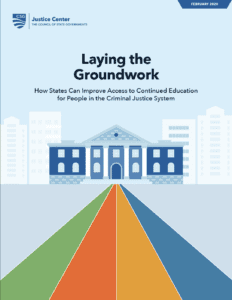
How States Block Access to Continued Education for People in the Criminal Justice System
A new 50-state report reveals how state policies fail to support—and often restrict—incarcerated people from accessing continued education.
A new report 50-state report reveals how state policies fail to support—and often restrict—incarcerated people from accessing continued education. This is despite research showing that such education can significantly reduce reoffending and increase employment rates.
The report, Laying the Groundwork: How States Can Improve Access to Continued Education for People in the Criminal Justice System, finds that only 10 states allow all people behind bars to access college and employment certification courses. The remaining 40 states prohibit certain segments of the incarcerated population from participating in educational attainment opportunities. This is despite a 27% unemployment rate for formerly incarcerated people—higher than the U.S. unemployment rate during the Great Depression—and rearrest rates as high as 40% within one year of release.
 Laying the Groundwork also reveals that barriers to education aren’t confined to correctional facilities, but follow people after they’re released. For example: half of all public universities in the U.S. require applicants for admission to disclose their criminal history. This practice has been shown to discourage potential students from even completing their applications.
Laying the Groundwork also reveals that barriers to education aren’t confined to correctional facilities, but follow people after they’re released. For example: half of all public universities in the U.S. require applicants for admission to disclose their criminal history. This practice has been shown to discourage potential students from even completing their applications.
Most states can’t attribute these challenges to a lack of resources. Only three states use all of the federal funding available specifically to support postsecondary education for people in prison; the rest leave taxpayer money on the table. And two-thirds of states restrict state-based financial aid for currently and formerly incarcerated students, adding another barrier to continued education.
Laying the Groundwork is based on data collected through original surveys of all 50 state correctional agency education directors and parole-granting agencies, as well as extensive online research on state statutes, regulations, and administrative policies, and university application processes. The report includes 50 state-specific data reports which include detailed information on state policies and practices.
Laying the Groundwork outlines four essential building blocks states must have in place to make postsecondary education accessible to people impacted by the criminal justice system, which include:
- Making use of available funding;
- Offering a variety of programming aligned with local employer needs;
- Eliminating restrictions on participation; and
- Providing incentives and supports to encourage participation and completion.
Currently, no state has all four of these basic elements in place. And less than half of states meet the criteria for each one of the building blocks, demonstrating that while states may recognize the importance of continued education, they can do much more to ensure that currently and formerly incarcerated people can access it.
To help states make continued education more effective and attainable, Laying the Groundwork includes checklists of best practices that can inform efforts to improve state statute, administrative policy, and funding practices. States can use these checklists to ensure that they are doing all they can to make their communities safer by providing people in correctional facilities and who have a criminal record the opportunity to continue their education.
Laying the Groundwork was created thanks to the support of the Lumina Foundation. Read the full report and view state-specific resources.










